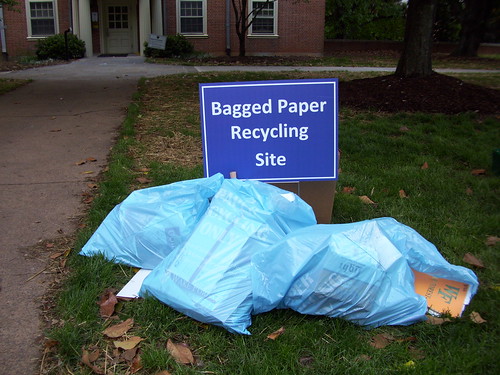Move-out waste reduction efforts yield increased success
 Residence Life and Housing, Facilities and Campus Services, and the Office of Sustainability improved on the success of the end-of-year move-out waste reduction efforts again this year. Through effective programming and student involvement, 10.136 tons of books, house wares, clothing, paper and other items were diverted from the waste stream. This number, 13.34 percent of the total waste stream for campus move-out, represents a nearly 6 ton increase in waste diverted over last year’s total.
Residence Life and Housing, Facilities and Campus Services, and the Office of Sustainability improved on the success of the end-of-year move-out waste reduction efforts again this year. Through effective programming and student involvement, 10.136 tons of books, house wares, clothing, paper and other items were diverted from the waste stream. This number, 13.34 percent of the total waste stream for campus move-out, represents a nearly 6 ton increase in waste diverted over last year’s total.
Deacs Donate, a program designed by the Resident Student Association and Residence Life and Housing to collect house wares, furniture, clothing and canned goods disposed of by students during move-out, put 7100 pounds of goods into the hands of the Salvation Army and those in need. In addition to bags of clothing, towels, bedding and small appliances, 108 area rugs, 90 shelving units, 8 televisions, and 22 pieces of furniture were collected through this program.
Students once again kept used textbooks out of the dumpsters through the Better World Books program. Large cardboard collection boxes were placed near check-out lines in the Campus Bookstore so that students could make the quick decision to donate books that the bookstore was unable to buy back. More than 1500 pounds of books from the university will be sold to fund literacy programs around the globe.
Nearly 5 tons of paper was collected for recycling between May 6, when the first students moved out of residence halls and May 16, when all seniors vacated their residence halls. This category represents that largest increase in waste diversion of any single category. Students recycled 10 times as much paper this year as was collected during the pilot Recycle Your Notes campaign last year. This success can be attributed to new individual paper recycling bags, designed and distributed by Residence Life and Housing.
First-year students were given the option of returning or reusing the green personal recycling totes distributed during orientation this year. Through an effective collaboration between Residence Life and Housing and Waste Reduction and Recycling Manager, Megan Anderson, more than 600 bins were collected for redistribution to returning students next year, which kept 1278 pounds of plastic out of the waste stream.
That the total waste diverted more than doubled from last year is encouraging. In order to maximize the positive environmental impact of our programs, however, the total waste created by the campus must be minimized. By measuring and monitoring the total waste generated during this period, the university has taken a critical step toward supporting students in reducing that number.
By Caitlin Brooks, Communications and Outreach Intern
